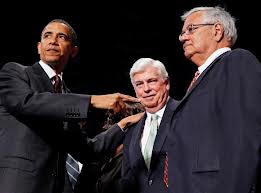After Five Years, Dodd-Frank Is As Bad As We Thought It Would Be
< < Go Back
When the Dodd-Frank Act took effect on July 21, 2010, critics were fast to predict that the 2,300 page-long legislation, which passed the House without a single Republican vote and received only three GOP votes in the Senate would fail. Tomorrow will mark the five-year anniversary of Dodd-Frank and its unfortunate distorting effects. Just as when it was passed, the legislation remains unable to address the problems it was intended to. The legislation has overwhelmed the regulatory system, stifled the financial industry, impaired economic growth, and done nothing to correct the pernicious effects of “too big to fail.” But that’s only the beginning: Many more of its regulations still need to be written, some several years down the road, all of which injects massive uncertainty into the financial industry. Here is a round-up of interesting articles to read before this sad anniversary. First, we have a great piece by Chairman Hensarling in the Wall Street Journal (“After Five Years, Dodd-Frank is a Failure.”).
There’s also a new report by John Berlau at CEI that shows how Dodd-Frank has stifled competition among the banks even more so than before the financial crisis. A failure to approve new banks, for instance, means that those “too big to fail” banks are now more entrenched than ever.
The New York Times has an interesting piece (“Fannie and Freddie are Back, Bigger and Badder Than Ever“) by Bethany McLean. It’s must read recap of the promises of what Freddie and Fannie would achieve vs. actually happened, along with the failure to reform two agencies in the aftermath of the financial crisis.
The proposed solutions for this mess? Among other things, Senator Warren believes it’s time to bring back the Glass-Steagall Act, a law that would require big banks to divide commercial and investment banking. Most economists and Federal Reserve policymakers disagree that the repeal of Glass-Steagall had anything to do with the financial crisis but, Democratic presidential candidates Bernie Sanders Martin O’Malley support the idea nonetheless. Hillary Clinton hasn’t said yet what she thinks of the proposal. However, according to Kevin Cirilli at The Hill, the White House is distancing itself from this push…
More From National Review Online:




